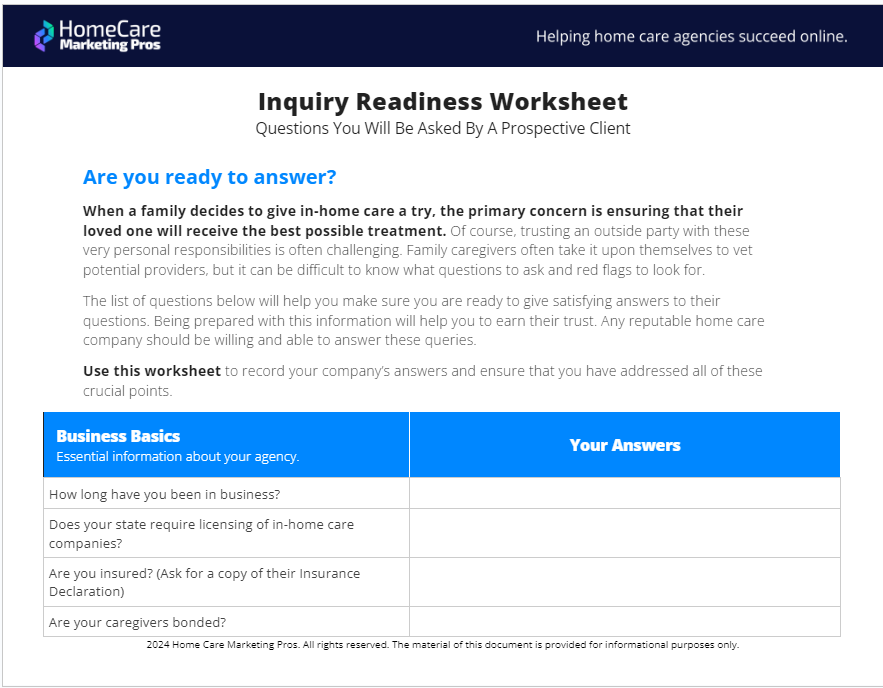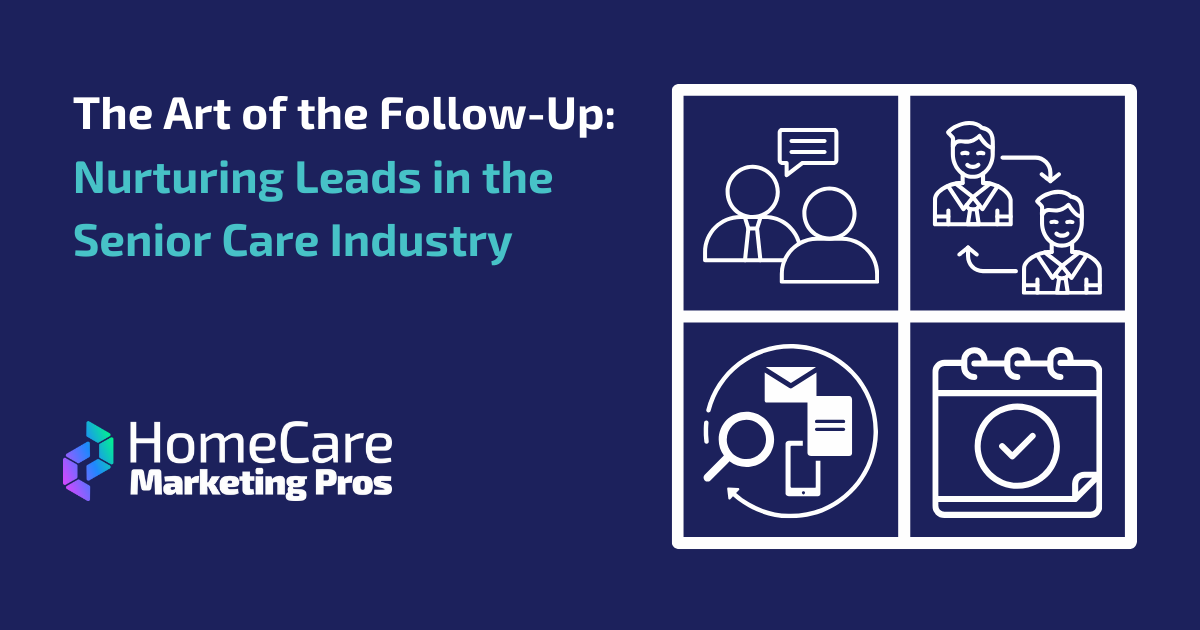Crafting a Winning Home Care Sales Script for Inbound Leads
The basics of writing a script for nurturing inbound internet leads
Be sure to go to the end for Free Bonus Content 🚀

When new leads come in via internet referrals, like search engines, PPC campaigns, or website contact forms, what’s your plan? Do you have a process that’s been documented, measured, and tested?
If your senior care business doesn’t use phone scripts, then you’re likely missing out on highly qualified clients. Responding to those leads quickly, consistently, and professionally can increase your sales.
Before you cringe at the pressure to close that sale over the phone, stop! The first contact you make with a lead who comes in through an internet referral is not about closing the sale, and it’s not even about over-qualifying that lead. The purpose of the first interaction is to establish a relationship in which the potential client trusts your agency.
Do you need a script for contacting home care leads?
Peter Droubay, a corporate trainer with decades of experience in home care sales has mapped out the principles of scripts for making first contact with internet leads. Even with decades of experience, he still relies on scripts to nurture new leads.
“I make thousands of these calls myself, always based on a script, always trying to hone the script and make it more effective” Peter said in a Caring.com webinar on using scripts to convert leads.
Many agencies don’t see the difference between leads based on their referral sources, treating all leads the same. “There is a difference between the kind of marketing that you do to pre-professional referrals in the community and then all of your other advertising, primarily online these days. They’re different in the type of lead that comes in, and you need a different approach to each.”
Leads that come to you through internet marketing are in the shopping phase of their home care journey. They may not know what’s available, exactly what kind of services they need, or what those services cost. That first contact will help you learn the client and help the client learn you.
Here are the best practices Peter recommends.
Why have a call script?
When you go into client conversations with a plan, you’re more likely to get the outcome you want. Phone scripts help you:
- Establish a pattern and process that can be measured and duplicated so you can optimize to increase conversion rates.
- Gain control of the conversation so you can set more appointments.
- Easily get calls back on track if the conversation veers away from the most important information.
- Form a plan to respond to client questions and objections.
- Polish your reputation in the market—if leads can sense that you have a consistent process and a goal, they’re more likely to trust your agency and see you as a serious player.
You may get some resistance from your senior care team when you introduce scripts for the first time, but don’t let that deter you. Documented processes reinforce your commitment to professionalism and quality, and some members of your team may even change their tune once they realize how much easier it is to use a script when speaking to clients.
How to make great lead calls every time
- Have one script for all internet-based leads. It establishes consistency and professional polish—it also ensures you give the right information to your leads, and get the right information from them as well.
- Designate one person to make and take calls from these leads, train a few as backup.
- The goal of these phone calls is not to over-qualify leads or close sales (in fact, assume every lead would make a great client). Instead, measure the success of these scripts by appointments scheduled.
- Understand what the potential client needs. They’re not clients yet, they’re just shopping, so answer their questions and be an educator.
- Control the call with questions. Your job is to lead the conversation with exploratory questions and do very little talking.
- Diagnose and prescribe. These leads are still figuring out the type of senior care they need; your role is to guide them toward the best solution and make recommendations.
- Use consultative language like could, may, and might. For instance, “We may be able to help. If not, we’ll help you find the resources you need.”
- Work with urgency to solve the lead’s problems, not with urgency to close the sale.
- Use assumptive closing techniques and always schedule the assessment.
The 6 parts of an excellent sales script
If the call gets off track, a script helps you bring it back. Treat it like a checklist—don’t move on until you’ve completed a step.
- Greeting and introduction: Tell the lead who you are and why you’re calling. Don’t forget to ask an opening question.
- Discovery: Ask exploratory questions to get to the heart of the lead’s needs, fears, and barriers.
- Looping: Repeat their needs and concerns back to them to demonstrate that you’re listening and that you understand what they need.
- Recommendations: Be an educator and a resource. Talk to them about the information you’ll send and how a care consultation or assessment can help.
- Appointment setting: Schedule an appointment with as many leads as you can. Don’t over-qualify at this stage—that’s for later.
- Recap and next steps: Tell the lead what they can expect at the consultation.
Example of a call script
Greeting and introduction
Hi! My name is ______ and I’m calling for [the lead’s name]. I’m a representative for Autumn Ridge Home Care. I saw that you requested a call on our website, and I’m calling to follow up. I help seniors and their families here in [your town or area] find the best senior care services for them, and I hope I can help you too. I see here that you’re interested in home care for your father. Can you tell me more about what prompted your search?
Discovery
Ask questions that help you suss out the source of their needs and what concerns they have. For example:
Tell me more about your dad. What’s changed with his health lately?
In your opinion, what kind of help does he need?
What are the biggest concerns you have?
What worries you about this process?
What is the ideal outcome for you and your family?
Looping
Given his recent lapses in memory, it sounds like you’re nervous about your father living on his own. You’ve looked at some assisted living facilities, but you’re not sure if he’s ready to give up that much independence, so you’re exploring in-home care options. Does that sound right? Did I miss anything?
Recommendations
He might be a good candidate for memory care and some occupational therapy services. We have great care teams that specialize in both.
To start, I’m going to send you a few resources. There’s a chart that compares assisted living against come home care services, and that might help you start thinking about your options. I’m also going to send you a questionnaire you can go through with your dad. I recommend going through it together so he can feel as involved in the process as possible.
Let’s also set up an appointment with our care coordinator Kendra. She’ll come by your dad’s house to do an assessment and talk about care options. She’ll ask you a lot of questions, and she can get started building a care plan together.
If it turns out that Autumn Ridge isn’t the right fit, we can get you connected to providers who might be able to meet your needs.
Appointment setting
Let’s start with your dad’s address. Kendra can meet you there on Thursday or Friday. The appointment should take about an hour. Do you prefer morning, afternoon, or evening? How about 5 o’clock, or would 6:30 be better?
Recap and next steps
To recap: We need to make sure your dad is safe to live on his own, and whether in-home care services are most beneficial. I’m going to send you the in-home vs. assisted living chart and a questionnaire you and your dad can do together. You’ll get that by email shortly after this call.
Kendra McClain, our care coordinator, will come by this Friday afternoon, January 16, at 6:30 p.m. to do an assessment and consultation, and to answer any questions you have. The address I have is 1308 Grove Avenue in Byrneville, correct? What’s a good phone number to reach you that day?
Who else should we include in the meeting besides you and your dad? Your aunt? Great. How can we make sure she’s there?
While she’s there, Kendra can help you start exploring payment options. Do you have a budget in mind? Can you tell me more about the resources you hope to use?
Bonus Content #1:
Inquiry Readiness Worksheet: Questions You Will Be Asked By A Prospective Client
Bonus Content #2:
How to Overcome Common Objections and Win New Clients
Ready to convert more client leads?
Home Care Marketing Pros help you establish professional, repeatable processes that help you add more client leads to your sales funnel and convert those leads into happy clients. Ready to get started? Book a Strategy Session to find out more!










